Bryce Moore's Blog, page 296
July 1, 2011
Classic Movie Review: Treasure of the Sierra Madre
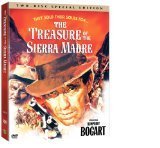
 "Badges? We ain't got no badges. We don't need no badges. I don't have to show you any stinking badges."
"Badges? We ain't got no badges. We don't need no badges. I don't have to show you any stinking badges."That line is a gold mine. It's almost as versatile as Supercalifragilisticexpialidocious, with the added benefit that if you say it loud enough, you sound awesome, instead of just precocious.
I had the pleasure last night of introducing a friend to Treasure of the Sierra Madre (actually to Humphrey Bogart movies in general, as well). And it occurred to me while watching it that a lot of my readers out there might not have seen the movie (voted as AFI's #38 best film of all time). If you haven't seen this film, then you owe it to yourself to rent it (or check it out from a certain library--hint hint.)
It focuses on Bogart, a down-on-his-luck drifter who's desperate for money. He dreams up a plan to go pan for gold and strike it rich, even though he has no experience with the wilderness at all. He meets an acquaintance who decides to go in with him on the expedition, and they convince and old-timer to be their guide. Naturally, gold is found. But the movie isn't really about striking it rich--it's about the effect of money on people. The lack of it, the abundance of it--money money money. The old-timer (director John Huston's father) has a quote that sums it up: "I know what gold does to men's souls."
If you're not a regular classic movie watcher, then you need to realize going into this that the movie is paced differently from the adventure movies of today. There are fight scenes, there's tension, but it's a different rhythm, and you need to give it time to develop. Bogart has a superb performance--one of the best of his career, and really an iconic one at that. I don't recall a more believable and disturbing descent into insanity and paranoia captured on film. Really great stuff.
In any case, give it a shot. The last time I'd seen it, I was in my young teens. This is a movie that gets better with age. Four stars.

Published on July 01, 2011 10:26
June 30, 2011
Update on Bachelordom
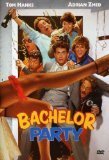

 Many of you keep asking me how I'm doing (probably concerned with my mopey posts from earlier this week). So I thought I'd let you all know.
Many of you keep asking me how I'm doing (probably concerned with my mopey posts from earlier this week). So I thought I'd let you all know.I'm fine.
It helps that I haven't had a chance to breathe all week. I've been in the midst of interviewing candidates for a position at work, and that ended up taking far more of my time than I thought it would (as so often is the case). But interviews are done now, and I should (theoretically) have more time.
It also helps that I'm getting used to being alone. I don't like it anymore than I did, but I am more accustomed to it now. (The fact that I'm getting very close to leaving to head to Slovakia also helps in this regard). I've gotten a lot of housework done, and I've been staying busy and constructive. Movies have been watched, and far less writing has happened than I'd hoped. (That's not really due to sloth on my part--just other things that have taken my time. Yesterday, for example, I had a two hour discussion with my book designer about books I liked and ideas we had for different cool covers. This books is going to look awesome. Awe. Some. But when I do that for two hours, I don't have much in the way of time left to work on Tarnhelm, my latest project.)
The garden isn't dead yet. That's a good thing. And it actually is growing, which is even better. It's helped that it's rained so often--less chance of me killing things by forgetting to water. I've picked a lot of strawberries and frozen them. The house is still clean, and I'm not starving.
So all in all, things have been a success. Less bad than they could have been. Thanks again all for your concern and support. I wouldn't want to do this on a regular basis, but it's been good for my family--not to be apart, but to have Denisa and the kids get the extra time in Slovakia. They're all doing well. The kids are speaking way more Slovak than they usually do, so that's dandy. And Denisa's dental bill will come to around $1000 instead of $4000. Always a plus.
In any case, I've got to go teach a Masters class now, so I must be off. Happy Thursday, everyone!

Published on June 30, 2011 09:48
June 29, 2011
Search by Image with Google, and 1982 Predictions for Technology
![2001: A Space Odyssey [Blu-ray]](https://i.gr-assets.com/images/S/compressed.photo.goodreads.com/hostedimages/1380456356i/2404559.jpg)

 Every so often, the internet presents me with some sort of new technology that just makes me happy to live in a society capable of producing such a thing. Today's wonder? Google's search by image. You can drag any image into this little tool, and Google searches for information about the image. It's like Google Goggles (the ability to take a picture and search for information about it online) without the picture taking. I suppose it's just an easy step from that, but it still is cool enough that it makes me really excited. Here's a video--check it out:
Every so often, the internet presents me with some sort of new technology that just makes me happy to live in a society capable of producing such a thing. Today's wonder? Google's search by image. You can drag any image into this little tool, and Google searches for information about the image. It's like Google Goggles (the ability to take a picture and search for information about it online) without the picture taking. I suppose it's just an easy step from that, but it still is cool enough that it makes me really excited. Here's a video--check it out:And in other news, here's a link to a 1982 article by the New York Times that explored where technology would be by the end of the century. They got some of the specifics wrong, but as far as the broader implications of technology, they seemed to be pretty spot on to me. Makes me wonder where we'll be in another 20 years.

Published on June 29, 2011 12:25
June 28, 2011
Vodnik Update--Offer Input!

 It's been a while since I did an update on Vodnik for you all, and I thought I'd take a (quick) moment to let you know what's happening on that front. We're still in editing mode--my editor and I have been bouncing it back and forth. Hopefully a fairly finalized draft is close to being finished. There'll still be more edits ahead, but the extent of the edits is becoming smaller and smaller. (Or at least, it was the last I checked--for all I know, I've got a big heaping plate o' edits to tackle next round. Here's hoping I don't . . . )
It's been a while since I did an update on Vodnik for you all, and I thought I'd take a (quick) moment to let you know what's happening on that front. We're still in editing mode--my editor and I have been bouncing it back and forth. Hopefully a fairly finalized draft is close to being finished. There'll still be more edits ahead, but the extent of the edits is becoming smaller and smaller. (Or at least, it was the last I checked--for all I know, I've got a big heaping plate o' edits to tackle next round. Here's hoping I don't . . . )At the same time, other parts of the book are moving forward. Discussions of how the book should look, what the cover might potentially be--fun stuff like that. Things I can't really talk about here, but I thought you'd like to know it was happening, nonetheless. And with that in mind, here's a chance for you to offer some feedback. Any of you readers out there have any books you can think of that really impressed you, from a design standpoint? (Cover layout, interior layout, etc.) It actually looks like I'll have a chance to give some suggestions on this point of the process--something which authors don't often get, and which I'm very excited about. (Yay for smaller presses who pay attention to new authors!)
Anyway--I'm trying to think of sample books that have stood out to me, but I thought I'd throw this open to the masses to see if any of you had ideas. Please share!

Published on June 28, 2011 09:37
June 27, 2011
Just How Selfish am I?
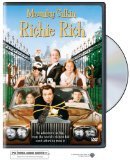
 I'll be honest. (Not that I'm usually dishonest on this blog, but I'll be EXTRA honest right now.) I've always considered myself a fairly selfish person. Not that I didn't give of my time and means to others when asked to or when I saw someone in need, but overall, I just had this nagging feeling all along that I wasn't nearly nice enough. That I was far too jealous of my time. Does that make sense? It wasn't that I wasn't giving, it was that I gave with the wrong sort of spirit. At least, that's how it felt to me. Even with my kids, I felt like I should always be doing more for them.
I'll be honest. (Not that I'm usually dishonest on this blog, but I'll be EXTRA honest right now.) I've always considered myself a fairly selfish person. Not that I didn't give of my time and means to others when asked to or when I saw someone in need, but overall, I just had this nagging feeling all along that I wasn't nearly nice enough. That I was far too jealous of my time. Does that make sense? It wasn't that I wasn't giving, it was that I gave with the wrong sort of spirit. At least, that's how it felt to me. Even with my kids, I felt like I should always be doing more for them.This whole "time alone" thing has made me reassess that guilt. Here's the thing. I'm not a particularly happy person living alone. I've realized that most of what I do, I do for my family, not for me. The times that I want to do something for me isn't because I'm particularly selfish or time-greedy. It's because I'm genuinely tired and want a bit of a break. And I don't think there's anything wrong with that.
I've been really busy since I dropped Denisa and the kids off at the airport. Making trips down to Portland and back for work-related stuff. I've left the house at 7:30 in the morning and gotten home at 8 at night. And that's good, because during the times I've had to just be at home, it hasn't been very pleasant. I have to make a conscious decision to try and forget feeling lonely and do something else. That's probably why I've only watched two movies, but I've swept the kitchen, done the dishes, vacuumed the entire house, worked in the garden(!), cleaned my room, cleaned the kids rooms, mowed the lawn--see a pattern here? Anything to take my mind off of my family.
I suppose I'm just surprised that my family is as central to who I am as a person and what I do to have fun and enjoy myself. Yes, at times I can get frazzled and tired, and I really want some quiet time now and then. But going without family, cold turkey . . . not fun. Not fun at all. I guess I'm really not as independent as I always thought.
I'm not meaning to brag about what a non-selfish guy I am. It's just not every day that one of your self-perceptions gets so fundamentally challenged. I'm more in kind of a funk of a mood, and I'm trying to write to get myself out of it--and you, my faithful readers, are the victims of the funk. My apologies.
Sheesh. This has turned into a downer of a post, and it hasn't helped anything. Maybe I'll go clean the bathroom . . .

Published on June 27, 2011 09:30
June 24, 2011
Crazy Busy
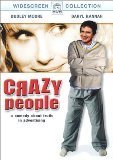
 I know--it's Friday, and I really ought to have something mindblowingly interesting to tell you all, but I'm running on empty right now. Sorry. I've been doing work-related things for fifteen hours yesterday, twelve today, and I've got more lined up for the next four days.
I know--it's Friday, and I really ought to have something mindblowingly interesting to tell you all, but I'm running on empty right now. Sorry. I've been doing work-related things for fifteen hours yesterday, twelve today, and I've got more lined up for the next four days.Deep breaths.
Have a nice weekend, all.

Published on June 24, 2011 14:03
June 22, 2011
Review: Super 8--How Can You Recapture a Moment in Time?
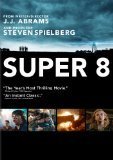
 There's been a lot of buzz around Super 8. The movie directed by Lost creator JJ Abrams, supposed to be inspired by the works of 1980s vintage Spielberg, and produced by The Beard to boot. I've read several reviews of the movie--careful to avoid any real spoilers--and they've gone one of two ways: either people loved it, or they weren't crazy about it. The interesting thing is that the opinions usually hinged on one thing: how well they felt the movie recreated that 1980s Spielberg vibe. I'll get to that in a minute.
There's been a lot of buzz around Super 8. The movie directed by Lost creator JJ Abrams, supposed to be inspired by the works of 1980s vintage Spielberg, and produced by The Beard to boot. I've read several reviews of the movie--careful to avoid any real spoilers--and they've gone one of two ways: either people loved it, or they weren't crazy about it. The interesting thing is that the opinions usually hinged on one thing: how well they felt the movie recreated that 1980s Spielberg vibe. I'll get to that in a minute.First off, my review. 3.5 stars. This movie got really close to perfect for me. Take the gang of kids from The Goonies (but make them more fully fleshed out as characters), add some family relationship drama ala ET, mix in a bit of monster on the loose mayhem by way of Cloverfield, a pinch of Close Encounters of the Third Kind mystery and zaniness, mix in a good helping of Stand By Me, and you end up with this movie. The kids do a fantastic acting job--they really sell the film. It's also helped out by a great Michael Giacchino score. (Seriously, I wonder if the man is a rising star in my book. I've loved a lot of his stuff: particularly the score for Up.) The effects in the movie are a lot of fun, and they do what they should--spice the film perfectly, without replacing the actual content. The movie has a lot of effects, but it's not about the effects. That's an important distinction. Anyway--I don't want to spoil this movie for you, so that's about all you're going to get out of me, content-wise.
But I've got some more thoughts on the subject of Abrams recapturing Spielberg. Some have criticized the movie for being too much like Spielberg. They say Abrams tries to imitate earlier films, but he falls short of the mark. This is a criticism that just doesn't hold water for me. People are always comparing movies to earlier films, and--especially when the films are associated with a lot of nostalgia--the newer films always fall short. Age has a way of making a movie impregnable, as if a film gets a badge of honor, just for being older. This is especially true with genre movies and good blockbusters. The blockbusters of today are never as good as the blockbusters of twenty years ago.
Bogus.
Reviewers responding to a movie today that evokes movies from yesterday are comparing their experience today with their prolonged, twenty year relationship of yesterday. No movie can recapture the feeling I had when I saw Princess Bride or The Goonies for the first time. Not anymore. Why is that? Because I was a different person when I saw them. I hadn't seen a fraction of the movies I've seen today. I didn't have multiple degrees. I wasn't a father. And to complicate matters more, The Princess Bride has had time to ascend in my estimation over the years. Repeat viewings, shared experiences. Films like that get an air about them--a sort of mystique that can't be immediately replicated. The first time I watched Groundhog Day, I really liked it. But I didn't have the same relation to it that I have today--the movie and I have evolved over the years, and my opinion of it has changed with it. Comparing a first viewing of a film with an opinion I have of a movie I love is like evaluating a first impression of a person by comparing them to how close I feel to a family member. Does that make sense?
Will kids who watch Super 8 today feel in twenty years what I feel for some of the 80s movies? Darned tootin' they will. It's a great movie. It captures adolescence and pins it down on celluloid, just like earlier movies have done. Was Super 8 as good as The Goonies? I believe it was. But I also realize I can't really give an unbiased answer to that question.
And neither can any of the reviewers trying to put Super 8 down for its inability to duplicate that magic. Folks, the magic hasn't changed--we have.

Published on June 22, 2011 19:18
End Anonymity: A Solution to Road Rage, the Internet and More

 I was driving back from Portland yesterday, fresh from dropping off the fam at the bus stop, when I almost got in a car accident. I was on an unfamiliar stretch of road (curse you, GPS!), and totally missed seeing another car. He was in my blind spot and in a left turn only lane, and he decided to go straight instead of turning. I went to get over, and we about collided. It seemed rather close--let's just leave it at that. And while I was more than a bit irritated with him, I also realize that I might have read the road signs wrong--it's certainly possible that he wasn't in a left turn only lane. Could be my bad, so I felt bad about it, too.
I was driving back from Portland yesterday, fresh from dropping off the fam at the bus stop, when I almost got in a car accident. I was on an unfamiliar stretch of road (curse you, GPS!), and totally missed seeing another car. He was in my blind spot and in a left turn only lane, and he decided to go straight instead of turning. I went to get over, and we about collided. It seemed rather close--let's just leave it at that. And while I was more than a bit irritated with him, I also realize that I might have read the road signs wrong--it's certainly possible that he wasn't in a left turn only lane. Could be my bad, so I felt bad about it, too.In general, I like to think of myself as a competent driver. Of course, the problem with that is that I think almost everyone thinks of himself or herself as a competent driver. You don't get many people saying, "I am the worst driver you've ever seen."
We need to fix that.
We need a device that attaches to cars that shows the driver's record. Think of it--every time you cut someone off, a tally mark gets added to your public display. Every time you run a red light, or gun through an intersection, it all gets added up. The same for good driving. Let a guy merge into traffic? Tracked. Sure, the privacy nuts would have a field day with this, but think about it--when a really good driver makes an honest mistake, you'd be able to know it was an honest mistake. When an awful driver gets too high up there, then his car stops working.
You'd no longer be able to make broad, general claims like "I'm a competent driver." You'd be branded with a clearly understandable, non-debatable mark: "Speeds consistently, but other than that, a pretty darned good driver." Or maybe, "Rude and disgruntled law breaker on the verge of getting his car shut down remotely."
Because when you get right down to it, the roads are pretty much comparable to the internet. People are anonymous. There's little in the way of accountability--just some randomly placed police cars toodling around now and then. Make people accountable, and you'd do away with the road rage and rude driving. After all, when's the last time another pedestrian cut you off while walking? Unless you live in a big city (and are thus rendered anonymous), probably never. Or at least very rarely.
It was the same thing with Myspace. You could be fairly anonymous there, and so people posted who-knows-what. The place was lawless and more than a little greasy. Blech. Compare that to Facebook, where people use their real names and identities. Much less grease.
It makes me wonder what other bad situations anonymity contributes to. Thoughts?

Published on June 22, 2011 08:37
June 21, 2011
Flying Solo: Wife-less and Childless for the Next 2.5 Weeks
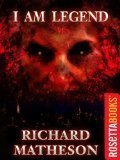
 I'm taking Denisa and the kids down to the bus today, where they'll depart on their 27 hour trip to Slovakia. Sending good thoughts their way over the next while would be much appreciated.
I'm taking Denisa and the kids down to the bus today, where they'll depart on their 27 hour trip to Slovakia. Sending good thoughts their way over the next while would be much appreciated.Sending good thoughts my way would also be appreciated.
I was thinking it over, and I don't think I've ever lived alone for longer than a few days. As in, ever-ever. I know there are people out there who live alone all the time, and I don't mean to be all mopey and whiny about it, but I think the transition from living as part of a household of 4 to living as a household of 1 is going to be strange and not very enjoyable. Still, I'm trying to look on the bright side:
Plenty of time to write. I can hopefully get through a good chunk of new Tarnhelm material. I've about revised the whole thing up to where I last left off, and I'm still very happy with it. My agent's looking at some of the big tweaks to see if they're operating as hoped for. It'll be nice to have the time to just write write write.
Once I clean something in the house, it'll stay clean--until I mess it up. My hope is to get things all in pretty good shape before I leave for Europe to meet back up with the fam.
I can watch any movie I want. Whenever I want.
I'll be wicked busy with the hiring search I'm running, so I wouldn't be at home much to be with my family, even if they were here.
I can Skype with the fam for free--a big bonus.
I don't honestly know how these 2.5 weeks will go. Seems like the perfect setup for a novel, actually. Maybe I should write that. :-)
In any case, this post is just to say I'm more than a little apprehensive about the next bit. I'll be sure to keep you all updated on what's happening.

Published on June 21, 2011 05:52
June 20, 2011
Quick Mini-Review: Breaker Morant
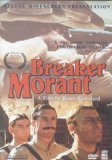
 I don't have a whole lot of time today. Lots going on at work, and this is the first chance I've had all day to even breathe. Still, I didn't want to leave you all empty handed, so I thought I'd take a moment to promote a movie I'd never heard of, and I'm thinking you might not have heard of it, either. Breaker Morant tells the story of a military operation during the Boer War in South Africa, back in the early 1900s. A group of Australian soldiers (fighting for the British) are accused of unlawfully killing several Boers and a German missionary. The story unfolds as the trial progresses. So it's a mix of a war movie and a courtroom drama, with some history thrown in on the side.
I don't have a whole lot of time today. Lots going on at work, and this is the first chance I've had all day to even breathe. Still, I didn't want to leave you all empty handed, so I thought I'd take a moment to promote a movie I'd never heard of, and I'm thinking you might not have heard of it, either. Breaker Morant tells the story of a military operation during the Boer War in South Africa, back in the early 1900s. A group of Australian soldiers (fighting for the British) are accused of unlawfully killing several Boers and a German missionary. The story unfolds as the trial progresses. So it's a mix of a war movie and a courtroom drama, with some history thrown in on the side.What sets it apart from other movies is some fine acting performances. I don't know what it is about foreign movies--they're just different from American movies. It might be the worldview, or it might be the approach to film making, but they feel different, and I like seeing things from different angles. It's not often I get a chance to watch an Australian movie. The story itself (based on historical events) is fascinating. The Boer War was one of the first "dirty wars"--wars where people stopped fighting according to a code of honor and started fighting using any means necessary to win. Contrasting that with the wars of today is an interesting exercise--seeing how they viewed it then, and how strange and unnatural it seemed to the people at the time. The movie also brings up excellent themes of the relative importance of human lives and what does it mean to tell the truth.
In any case, I'm out of time for today, but I highly recommend this movie. 3.5 stars, and well worth your time. Anyone out there already seen it? Speak up!

Published on June 20, 2011 11:13























